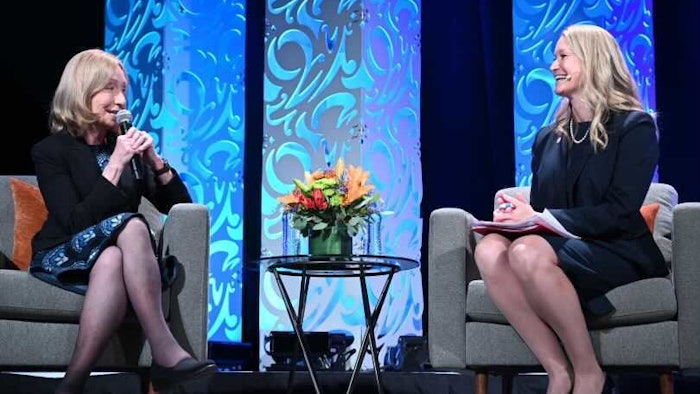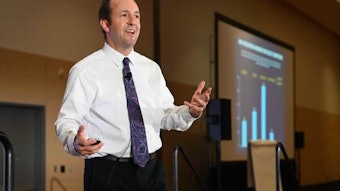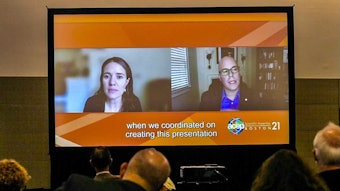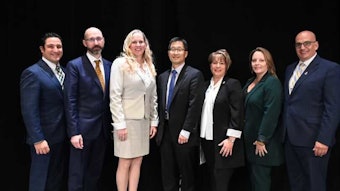Presidential Historian Draws Parallel Between Past and Present Hardships
Opening general session discussion dives into the common leadership traits of four past presidents

Renowned presidential historian Doris Kearns Goodwin covered a lot of territory during the ACEP21 opening general session, “Leadership During Turbulent Times.” She and ACEP President Gillian Schmitz, MD, FACEP, looked at a number of modern-day topics – stress, conflict management, consolidation, resilience and more – through a historical lens to identify tactics from the past that can help manage the challenges of today.
Ms. Goodwin’s most recent book focuses on the unique paths of four presidents whom she fondly refers to as “my guys” – Abraham Lincoln, Theodore Roosevelt, Franklin Roosevelt and Lyndon B. Johnson. During her keynote, she drew on her in-depth knowledge of each leader to discuss how they managed stress and overcame failures.
Looking for a direct comparison to our current circumstances, Ms. Goodwin laid the stage for the hardships Teddy Roosevelt faced as he was starting his presidency: “The industrial revolution has shaken up the economy, much like globalization and the tech revolution have done today. And for the first time, you have a gap between the rich and the poor. You have big companies swallowing small companies and a real sense of anger out in the streets… The people in the country feels split off from the people in the city.”
She explained that both the leaders of yesterday and today are navigating times of incredible uncertainty and unrest. History shows us “they were living with the same anxiety we’re living with now,” Ms. Goodwin explained. “I think it can give us hope that our generations before us faced more difficult times, and somehow the strength of leadership and the strength of the people responding to that leadership got us through. We can do it again.”
When Dr. Schmitz talked with Ms. Goodwin about the current climate of increasing consolidation in the health care and insurance industries, Ms. Goodwin compared it to Teddy Roosevelt’s experience during the Industrial Revolution. As larger companies were eating up smaller companies, she said Teddy Roosevelt realized the people in government have to fight for the people – not the unions, not the barons. She called this concept he was fighting for “fundamental fairness,” and it’s still highly relevant today.
“Maybe that's the fight that you guys are going to have to fight,” Ms. Goodwin said to the audience. “Something's happening in this country today, where these big mergers are taking place, and they're not necessarily giving us the efficiency and the fairness. It's fundamental fairness that I think [Teddy Roosevelt] was asking for. And that's what the square deal was. It was for the rich and the poor, the capitalists and the wage worker. And that's what we need to be fighting for.”
Ms. Goodwin and President Schmitz went on to talk about how leaders cope with stress, and it turns out each president put his own flavor on the modern-day concept of “self-care.” Abraham Lincoln sought refuge in the theater. Ms. Goodwin said President Lincoln was criticized for his attending shows so frequently, but “he said ‘If I didn't do it, the anxiety would kill me.’”
For Teddy Roosevelt, he insisted on two hours of daily exercise during his worst times of crisis. And then there was FDR, who instituted daily cocktail parties during which guests were forbidden to talk about the war. That scheduled social hour was his mental reprieve.
She encouraged ACEP attendees to prioritize whatever activities help them mentally escape the daily hardships of the ED, especially during the pandemic. “We only have a finite amount of mental energy and it has to be replenished by those kinds of activities.”
Dr. Schmitz asked Ms. Goodwin the age-old question: “Leaders: Are they born or made?” And Ms. Goodwin was thoughtful in her response.
“I think all of [these presidents] would agree, and I would argue that most leaders make themselves leaders, despite some of the gifts they might be given… Teddy Roosevelt wrote an essay in which he said, there's two kinds of success in the world. The first is if you're born with such an extraordinary talent… He put himself in the second category, one when people take ordinary qualities to an extraordinary degree through hard sustained work.”
She went on to explain: “That drive for success has to be there… And then if you’re lucky, you've got some gifts that you can turn into extraordinary qualities. Even if they're not extraordinary to begin with, they become talents that people will recognize.”
Download the mobile app for the most up-to-date content.











